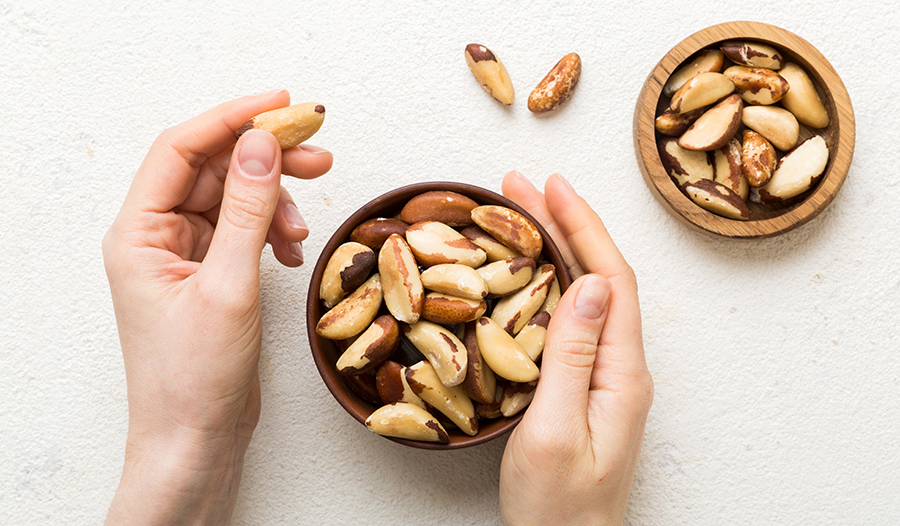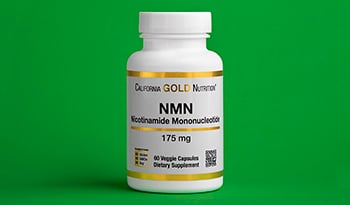How Selenium Supports Hormonal Health

Hormones are prominent conductors of overall health, influencing everything from metabolism and mood to sleep and reproduction. When the hormonal system, known as the endocrine system, gets out of balance, issues can arise throughout the body. Symptoms such as poor temperature regulation, hair thinning, depressed mood, low energy, premenstrual syndrome (PMS), and irregular periods may all be due to poor hormonal regulation.
The body requires several key nutrients, including selenium, for the creation and effective utilization of hormones. A trace mineral found in soil and certain foods, selenium plays a crucial role in several hormonal processes, including thyroid hormone metabolism, cardiovascular health, prevention of neurodegeneration and cancer, and healthy immune response.
Read on to learn about selenium’s effects on the body and hormonal balance, how to get more selenium in your diet, and natural strategies and supplements for achieving optimal hormonal health.
Selenium—A Micronutrient With Mighty Effects
Selenium exists in various forms in the body, but its primary function lies in the production of selenoproteins. These proteins play a vital role in numerous biological processes, including:
- Thyroid hormone metabolism: The thyroid gland houses the highest concentration of selenium in the body. Selenium is a key component of enzymes that convert the inactive thyroid hormone T4 into the active T3, which regulates metabolism, growth, and development.
- Protection from oxidative stress: Selenium functions as an antioxidant, shielding cells from damage caused by free radicals. This protection is particularly important for hormone-producing tissues like the thyroid and ovaries.
- Inflammation regulation: Chronic inflammation can negatively impact several areas of health. Selenium has been shown to influence immune function and inhibit inflammation.
Hormonal Imbalances Linked With Selenium Deficiency
People who live in areas with low-selenium soil, following a vegetarian or vegan diet, undergoing kidney dialysis, or living with HIV are more likely to be deficient in selenium. Selenium deficiency has been linked to the following hormonal imbalances.
Hypothyroidism
Low selenium levels are associated with an increased risk of hypothyroidism, a condition in which the thyroid gland does not produce enough hormones. If you experience unexplained weight gain, hair loss, fatigue, constipation, or irregular periods, you may be struggling with hypothyroidism.
Male Infertility
Male fertility is closely linked to hormonal health—and selenium plays a crucial role in this area. Selenium is essential for the production of selenoproteins, which are vital for sperm health. These proteins help protect sperm from oxidative damage, improve sperm motility (the ability to swim), and support overall sperm quality. A selenium deficiency can negatively impact male fertility, leading to reduced sperm count, decreased sperm motility, and abnormal sperm morphology.
Polycystic Ovary Syndrome (PCOS)
Studies suggest a potential link between low selenium and PCOS, a hormonal disorder affecting ovulation and menstrual regularity. Though the evidence for a direct correlation between selenium intake and PCOS outcomes is weak, studies show selenium improves antioxidant levels, which can benefit women with PCOS.
Cardiovascular Diseases
Studies suggest selenium intake may be positively associated with a reduced risk of coronary artery disease. Selenium can help prevent oxidative stress, protecting against free radical damage that can cause several chronic cardiovascular diseases related to plaque buildup.
Cognitive Decline
Blood levels of selenium naturally decline with age, and chronic selenium deficiency can negatively impact cognitive function. Studies suggest a higher selenium intake may protect against age-related cognitive decline.
Food Sources of Selenium
The best food sources of selenium include Brazil nuts, seafood (tuna and sardines), and organ meats. Brazil nuts are, by far, the best source of selenium. They contain about 70 to 90 micrograms per nut, as compared with tuna which has about 92 micrograms per 3-ounce serving.
It’s important to note that the amount of selenium found in plant-based food sources depends on the amount of selenium present in the soil in which it was grown. So, the amount of selenium per Brazil nut may vary.
How to Optimize Hormonal Health With Selenium
While selenium is crucial for hormonal health, there are important factors to keep in mind.
Know Your Selenium Status
Firstly, it’s important to know your baseline selenium levels before adding a supplement to your wellness routine. An add-on test to routine blood work can determine your selenium status. If you are deficient, a healthcare professional can recommend appropriate dietary or supplemental strategies.
How to Know Whether You Need a Supplement
Selenium supplementation can benefit those with deficiencies or who have difficulty meeting their daily needs through diet alone. The recommended daily intake (RDI) of selenium for adults is around 55 micrograms.
Most individuals are meeting the daily requirements for selenium. However, people who consume a vegetarian or vegan diet, those undergoing kidney dialysis, and people living with HIV are at increased risk of selenium deficiency.
If you are adding supplemental selenium to your diet, keep in mind the upper limit of selenium intake is around 400 micrograms. Toxicity may occur at doses higher than 900 micrograms.
Is Selenium Safe? Signs of Selenium Toxicity
Selenium toxicity can start with nausea, vomiting, and diarrhea. You may also notice fatigue, weakness, or nervous system issues like confusion, irritability, or even seizures. If you start to experience these symptoms after consuming selenium, please contact your doctor.
While selenium is safe for most people—and is often included in multivitamins—the following individuals should consult their healthcare practitioner before taking a selenium supplement:
- Pregnant and breastfeeding women: High doses of selenium may be harmful to the fetus or infant.
- Individuals with autoimmune thyroid or other disorders: People with autoimmune thyroid disorders or taking medications that interact with selenium should consult a healthcare professional before supplementation.
- People taking certain medications: Selenium may interfere with certain medications, including chemotherapy drugs, steroid medications, or certain psychiatric medications.
Remember, always aim to meet your body’s needs for selenium through foods before adding a supplement.
Complementary Strategies for Hormonal Health
Alongside ensuring adequate selenium intake, here are some additional tips for supporting hormonal health:
- Maintain a healthy weight: Excess adipose can disrupt hormone production and inflammatory levels.
- Manage stress: Chronic stress can interfere with cortisol regulation and cause issues with blood sugar, thyroid health, and other hormonal concerns.
- Prioritize sleep: Adequate sleep is essential for hormone regulation and metabolic recovery.
- Focus on whole foods and protein with each meal: Avoiding ultra-processed foods and aiming for adequate protein and fiber intake from whole foods can support hormonal health and overall wellness.
Other Supplements for Hormonal Health
While selenium offers significant benefits for hormonal health, it may not address all potential imbalances. Here are some additional supplements you can discuss with your doctor:
- Vitamin D: Vitamin D deficiency has been linked to several hormonal issues, including thyroid dysfunction and PCOS.
- Zinc: This mineral plays a role in various hormonal processes. Zinc deficiencies can affect fertility and thyroid function.
- Omega-3 fatty acids: Omega-3s offer anti-inflammatory properties that can benefit many areas of health.
- Multivitamin: Nutrient deficiencies rarely happen individually—if you are deficient in selenium, chances are you are deficient in others as well. A good quality multivitamin can help fill any nutrient gaps in your diet, ensuring your body gets what it needs. If you are adding in extra selenium, check your multivitamin to be sure it doesn’t already contain selenium.
Remember, consulting with a qualified healthcare professional is essential before starting any new supplement regimen. They can assess your individual needs, identify any potential interactions with medications, and recommend the most appropriate dosage.
Striking a Balance for Health & Hormones
Selenium acts as a silent guardian of hormonal health. By ensuring you’re getting enough selenium through diet or supplements (if needed), you are supporting your body’s endocrine system and hormonal balance. An integrative approach incorporating a healthy lifestyle alongside targeted supplements can improve your hormonal well-being and support overall health.
Please note: This is intended for informational purposes only and should not be construed as medical advice. Always consult a qualified healthcare professional before making any changes to your diet or supplement regimen.
References:
- Selenium: Health Professional Fact Sheet. National Institutes of Health. Accessed 9/3/24
- Wang F, Li C, Li S, Cui L, Zhao J, Liao L. Selenium and thyroid diseases. Front Endocrinol (Lausanne). 2023 Mar 24;14:1133000.
- Huang Z, Rose AH, Hoffmann PR. The role of selenium in inflammation and immunity: from molecular mechanisms to therapeutic opportunities. Antioxid Redox Signal. 2012 Apr 1;16(7):705-43.
- Barchielli G, Capperucci A, Tanini D. The Role of Selenium in Pathologies: An Updated Review. Antioxidants (Basel). 2022 Jan 27;11(2):251.
- Flores-Mateo G, Navas-Acien A, Pastor-Barriuso R, Guallar E. Selenium and coronary heart disease: a meta-analysis. Am J Clin Nutr. 2006 Oct;84(4):762-73.
- Boitani C, Puglisi R. Selenium, a key element in spermatogenesis and male fertility. Adv Exp Med Biol. 2008;636:65-73.
- Selenium Toxicity. Merck Manual Professional Version. Accessed 9/3/24
- MacFarquhar JK, Broussard DL, Melstrom P, Hutchinson R, Wolkin A, Martin C, Burk RF, Dunn JR, Green AL, Hammond R, Schaffner W, Jones TF. Acute selenium toxicity associated with a dietary supplement. Arch Intern Med. 2010 Feb 8;170(3):256-61.
DISCLAIMER:This Wellness Hub does not intend to provide diagnosis...
















































































 Table of Contents
Table of Contents















